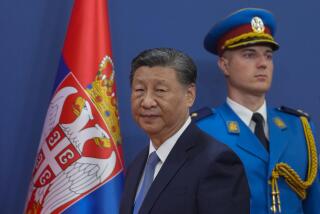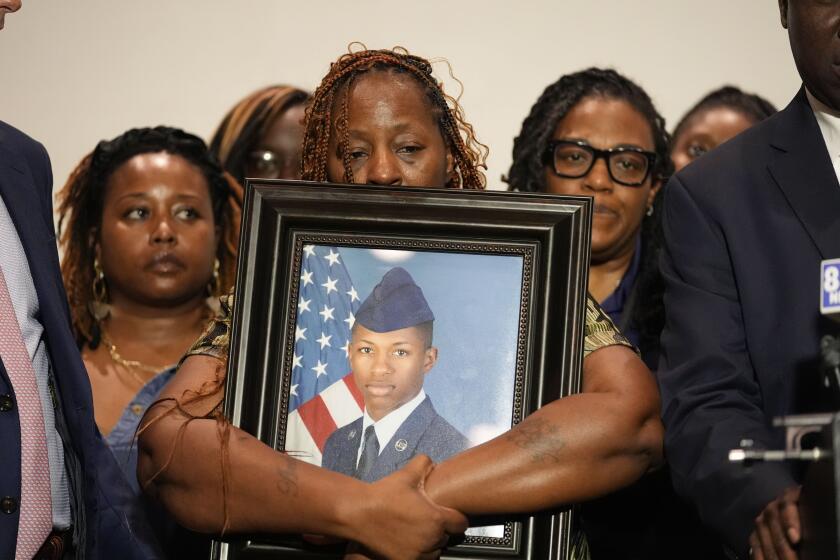Feinstein Snagged by Latino Backlash
Back in 1993, when California was scraping through the recession, a prominent lawmaker drew a line at the U.S.-Mexico border. In highest dudgeon, the stern-faced official declared enough was enough: “The American people have had it up to here. They want the illegal immigration stopped.”
Times change, issues come and go. With the economy humming, education reform is now all the rage, illegal immigration all but forgotten.
Leaders of the Latino community, however, remember the candidate who, they say, first raised the issue with her “up to here” ultimatum, helping stir the passions that produced Proposition 187 and its virulent strain of pinata politics: U.S. Sen. Dianne Feinstein.
To date, Republicans have borne the brunt of the backlash for the party’s aggressive promotion of the illegal-immigration initiative, which Gov. Pete Wilson seized and made the centerpiece of his 1994 comeback campaign. But as she nears her long-anticipated decision on whether to run for governor, Feinstein has her own little-noted problem with the state’s most important emerging voter group--and key Democratic constituency.
“She’s probably one of the Democrats with the greatest image problems in the Latino community,” said Arturo Vargas, head of the National Assn. of Latino Elected and Appointed Officials, a nonpartisan group. “She has been less than a positive advocate on issues that are important to Latinos in California.” Los Angeles County Supervisor Gloria Molina, one of Feinstein’s fellow Democrats, was blunter still: “Her record is pretty miserable.”
*
Feinstein’s tough stance on immigration is only part of the problem, though a big one for Molina and other prominent Latino leaders. In particular, they cite Feinstein’s 1993 proposal for a $1 border-crossing fee and her more recent support for stiffer rules on legal immigration. They also point to a dearth of Latinos in significant positions on Feinstein’s staff, and a history of standoffishness on the senator’s part.
“There’s been no concerted effort to come into the Latino community and meet with the leadership at that level,” Vargas maintained. State Assembly Majority Leader Antonio Villaraigosa, the chamber’s No. 2 Democrat, suggested much the same. “I don’t really know her very well, except what I read in the newspaper,” he said breezily. “I’ve never talked to her much.”
Sensing opportunity, Feinstein’s two potential rivals in the governor’s race, businessman Al Checchi and Lt. Gov. Gray Davis, have launched explicit efforts to court the Latino vote. Checchi is running ads on Spanish-language television, featuring his wife, Kathy, pitching in perfect Spanish. Davis is trying to win amigos with trips to Mexico and hands-across-the-border homilies.
Bill Carrick, Feinstein’s campaign-manager-in-waiting, insists that the senator “is clearly misunderstood.”
“This is a woman who ran for reelection in 1994 and came out against 187. It easily could have cost her the whole election,” he noted. Some people, he went on, have a problem when a Democrat says anything about illegal immigration.
Still, Feinstein’s very real troubles with Latino leaders make a compelling case for her to coax Assembly Speaker Cruz Bustamante to run for lieutenant governor. There have already been several discussions between the Feinstein and Bustamante camps.
The speaker, who will be termed out at the end of the year, could be an attractive candidate for several reasons. He has a pile of campaign cash, hails from the Central Valley, where Feinstein is notably weak and, not least, could be an enormous draw for Latino voters.
Further, he’s a relative moderate in the Feinstein vein, and the two know each other. When Feinstein launched her 1990 bid for governor, it was Bustamante, then a state legislative aide, who drove the candidate to her Fresno news conference.
*
Of course, with or without Bustamante on a Feinstein ticket, few Democrats worry about masses of Latino voters defecting to the GOP come November. The animosity toward Wilson, and by extension the Republican Party, runs too deep within California’s Latino community.
Instead, Democrats fret about a lack of enthusiasm keeping tens of thousands of Latinos from voting on election day--a show of apathy that could badly damage Democratic prospects up and down the ticket.
“The sentiment’s not so strong that someone is likely to vote for [state Atty. Gen.] Dan Lungren instead of Dianne Feinstein,” said one Democratic strategist in Sacramento, referring to the all-but-certain GOP nominee. “But you wonder how much motivation is there. It’s not as much as you would like to have from a crucial portion of the electorate.”
Take Molina, for instance. Given a Feinstein-Lungren match-up, she said, “I could never support a Lungren. But I’m not going to say that for the rest in the community that aren’t as passionately partisan as I am.”
With Democratic supporters like that, who needs Republican opposition?
More to Read
Start your day right
Sign up for Essential California for news, features and recommendations from the L.A. Times and beyond in your inbox six days a week.
You may occasionally receive promotional content from the Los Angeles Times.







